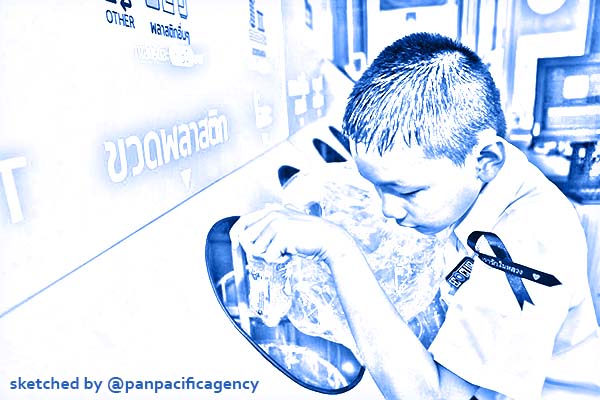Duterte mulling nationwide plastic ban

A student puts empty plastic bottles into a recycling separation bin at a waste management system learning centre at Praram 9 Kanchanapisek School. Apichart Jinakul. Sketched by the Pan Pacific Agency.
MANILA, Nov 8, 2019, PhilStar. President Duterte is mulling a nationwide ban on the use of plastics in a bid to mitigate climate change, amid what sectors have claimed as a pollution crisis in the country on account of poor solid waste laws and high usage of single-use plastic among consumers and businesses, The Philippine Star reported.
Duterte expressed his interest in banning plastic during last Wednesday’s Cabinet meeting, presidential spokesman Salvador Panelo said yesterday.
During the meeting, Vernice Victorio, president and CEO of the Natural Resources Development Corp. (NRDC), shared with the Cabinet the Priority Programs for Environment and Climate Change Resiliency.
It was during her presentation that Duterte floated the idea of banning the use of plastics, which according to him would require legislative action, said Panelo.
The NRDC is an attached government-owned and controlled corporation of the Department of Environment and Natural Resources.
Panelo said the plastic ban was discussed as part of the administration’s efforts to mitigate climate change.
Two pending measures by Sens. Cynthia Villar and Francis Pangilinan that seek to ban the use of single-use plastic are currently pending at the committee level.
The measures seek to ban food establishments, stores, markets and retailers from issuing single-use plastic. Consumers will instead be using reusable materials, while manufacturers will be tasked to control the circulation and disposal of single-use plastics.
The bill also seeks to give incentives to individuals and businesses that use alternative materials, as it provides for the prohibition of the importation of single-use plastic.
A 2015 report on plastic pollution ranked the Philippines as the third biggest source of plastic leaking into the oceans, after China and Indonesia.